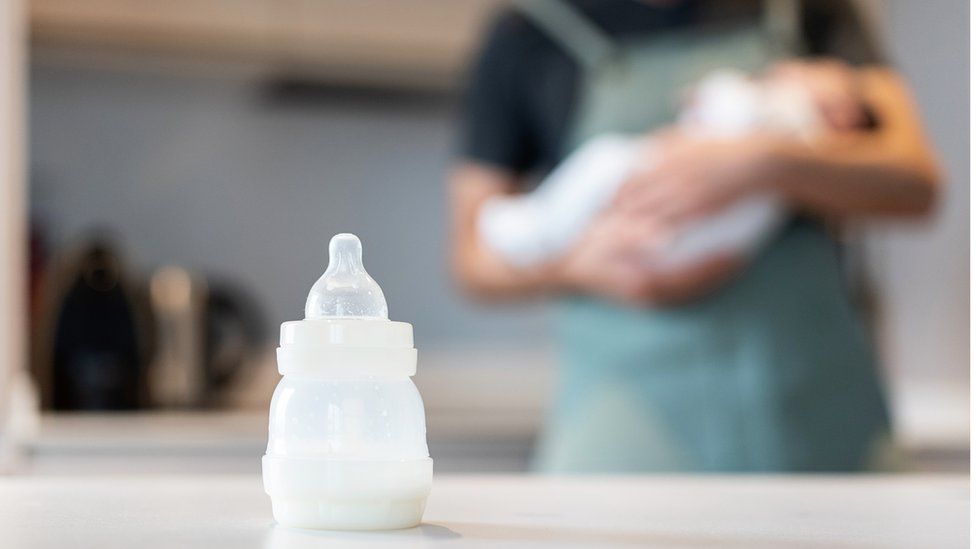 Image source, Getty Images
Image source, Getty Images
By Tom Espiner & Ashleigh Swan
BBC News
Makers of some popular food brands have raised prices by more than their costs over the past two years, according to the UK's competition watchdog.
This has helped push up the price shoppers pay for baby formula, baked beans and pet food, the Competition & Markets Authority (CMA) said.
About three quarters of branded suppliers have been making more profit on individual products.
But food firms said they had done all they could to absorb higher costs.
The findings are part of an analysis of pricing in 10 categories, which also includes milk, poultry, mayonnaise, baked beans, chilled desserts, ready meals, and lemonade.
High food price inflation has mainly been driven by rising energy and fertiliser costs, the CMA said.
But makers of most branded food items in the 10 categories have been putting prices up by more than their costs and "in doing so, have contributed to higher food price inflation", it added.
As a result shoppers have increasingly turned to own-label products, meaning branded products have lost market share, and so have actually been making less money overall.
Market concerns
But in the case of baby formula there are not many alternatives, and prices have risen by a quarter over the past two years. Profits on these products have been high.
New parents could make significant savings of £500 in the first year of a baby's life on baby formula by shopping around, the CMA added.
Cheaper formula still needs to follow rules on providing the nutrients babies need, it said.
But the market is dominated by two big players - Danone and Nestle - and there is little evidence of parents switching to cheaper alternatives.
"We're concerned that parents may not always have the right information to make informed choices and that suppliers may not have strong incentives to offer infant formula at competitive prices," said Sarah Cardell, chief executive of the CMA.
She added that the pace of food price rises, which was running at more than 10% in October, "has put huge strain on household budgets".
Pauline Cox, a nutritionist and author, said there was "very little difference" between branded and unbranded baby products in terms of their nutritional value for babies because UK rules are so strict.
However, if parents have any concerns about which type of formula is right for their baby, they should consult a doctor, she said.
Image source, Gemma Maxwell
Image caption,Gemma Maxwell, 31, from Glasgow, gave her son Finlay the bigger brands of formula, but says she will now shop around for her new born
Gemma Maxwell, 31, from Glasgow, is the mother of 3-year-old Finlay and a very recent new born baby.
She said "in the past because I saw people using bigger brands I thought they must be more beneficial for your baby".
New parents may hesitate to shop around for brands because the less well-known products are not marketed as widely, she said.
However, Ms Maxwell said she has friends that use discount baby formula brands.
"When we looked at the nutritional value of both formulas, they are the same," she said.
She says she will now shop around for different formulas, especially in the current cost-of-living crisis.
Image source, Diane Philips
Image caption,Diane Philips said she will probably stick to the bigger brands
However, Diane Phillips, 30, from Cauldon Lowe in Staffordshire, said she will probably stick to the bigger brands.
"I would be most comfortable with the brands that are more reputable" she said, adding that branding definitely plays a part when choosing the right formula.
However, she said she would consider other, less well-known brands if she was convinced the nutritional value was the same.
Industry group the British Retail Consortium said families could make "significant savings by switching to cheaper brands or own-label products, all of which provide the necessary nutrition for a healthy baby".
Price rises
Danone, which makes Aptamil and Cow & Gate, has more than 70% of the UK baby formula market.
It said that during a period of high inflation "we have worked very hard to absorb the significant cost increases we have faced, make savings, and minimise any price increases".
Danone sells "a range of formula milk products at different prices" and has "launched new larger, better value formats", a spokesperson said, adding that the "formula milk market is competitive".
The firm will "continue to engage with the CMA over the coming months", it said.
Nestle, which has 14% of the market with SMA and Little Steps, said it welcomed the review of the industry by the CMA.
"This is a complex and serious issue and we are open to all constructive dialogue to help parents in the most effective way possible," a Nestle spokesperson said.
"We have been working to cut our costs wherever possible and only increase prices as a last resort."
Industry group the Food and Drink Federation said manufacturers had absorbed costs to try to shield consumers from higher prices.
"However, with inflation hitting a 40-year high earlier this year, some price rises have been unavoidable," said Karen Betts, its chief executive.
The watchdog will probe the baby formula market further, and will also look at supermarket loyalty card schemes.
Some supermarkets have only been making cheaper prices available to customers on loyalty card schemes, and the watchdog will look at this practice in 2024.
In September, consumer group Which? warned that loyalty card schemes were not as good as they seem, with supermarkets Tesco and Sainsbury's increasing the prices of everyday items so the discounts for people with loyalty cards looked bigger than they really were.
However, both supermarkets rejected the claims.
The CMA has the power to enforce consumer law, and if it finds any reason to uphold concerns during an investigation, will normally work with firms to rectify any issues.
But the watchdog also has the power, if necessary, to compel firms to change their business practices, and can even fine companies.

 Movie
Movie 5 months ago
134
5 months ago
134 






![Presidents Day Weekend Car Sales [2021 Edition] Presidents Day Weekend Car Sales [2021 Edition]](https://www.findthebestcarprice.com/wp-content/uploads/Presidents-Day-Weekend-car-sales.jpg)



 English (United States)
English (United States)